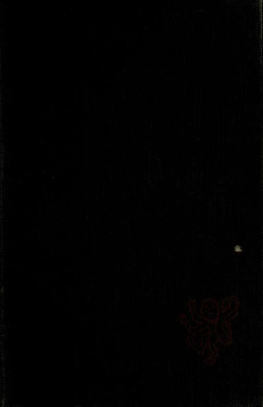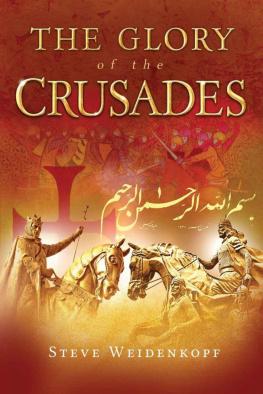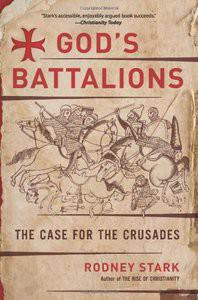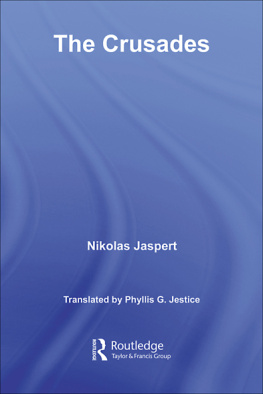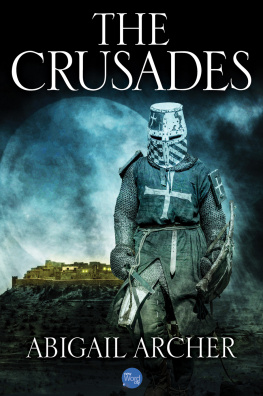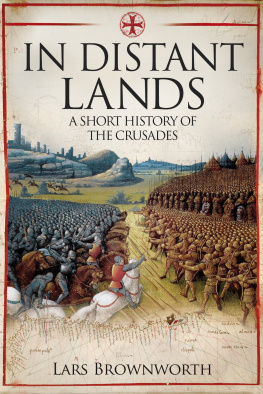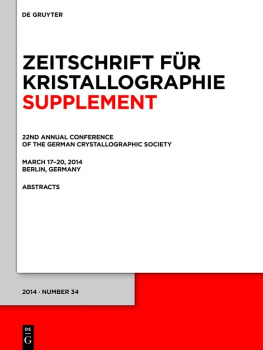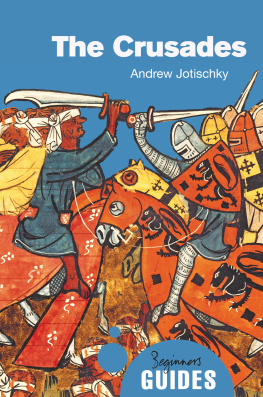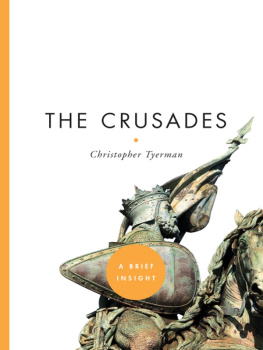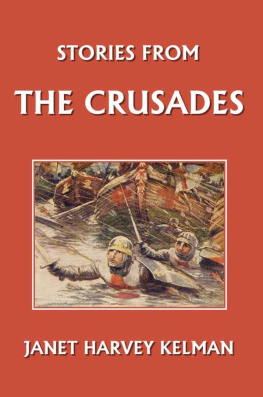This book made available by the Internet Archive.
Preface
This book is not intended to be a complete history of the Crusades. It deals only with what are generally known as the three first Crusades and with the history of the kingdom of Jerusalem up to the time of its conquest by Saladin.
I have considered the story of these three first Crusades and of the Frankish states of Syria chiefly from the point of view of the political situation in the Near East in the twelfth century. Given the breadth of the subject, the manner in which I have dealt with the whole phenomenon of the Crusades, with the relations between the Latin West and Byzantium and Islam, and with the attempt, unique of its kind, to graft a European state onto an Oriental environment, is inevitably sketchy and incomplete. What I, in the wake of a great many eminent historians with whom I do not aspire to comparison, have tried to do is to study the human aspect of this long, complex, and yet in spite of everything, glorious adventure.
Whatever one means by the word, there is no doubt that the early Crusades gave rise to a particular concept of glory which belongs specifically to the Latin West and which consequently contributed more than a little to the formation of that European civilization which, in our own time, has finally come to mean civilization itself.
The First Crusade was not a popular migration or a war of conquest undertaken by an ambitious monarch, nor was it a search for new colonies and trade routes, though all these elements were present in the Crusades to a comparatively minor degree. It remains an adventure without parallel in history because it was a real war
which does not appear to have been provoked by any of the normal causes of war. It cannot be compared to the lightning expansion of Islam in the seventh century in which a poor and warlike people, fired by the example of a great leader who was also the initiator of a new religious movement, set out to conquer the world. The Crusading phenomenon was infinitely more modest in its scope and objectives, but it possessed the one remarkable feature that for once a holy war was conducted in an apparently disinterested spirit, without real necessity and not inspired by any single great leader or prophet. Looking at the bare facts of the case, the First Crusade was an extravagant adventure which by sheer luckand perhaps just because it was so extravagantdid not end in disaster but finally succeeded beyond all expectation.
The sole object, motive, and justification of this adventure which in time grew vast enough to involve more or less deeply the conscience of the whole of Catholic Christendomwas the mirage of the Holy City, Jerusalem. It is Jerusalem alone which still gives this long succession of sufferings, atrocities, wars, feudal squabbles, and frequently disastrous military enterprises a glory which even the centuries have not dimmed. And yet at the end of the eleventh century, when Christianity had endured for a thousand years and the Moslems dominated Syria for four hundred, there was no need for the men of France, Flanders, and Provence to go out and fight for Jerusalem.
It is necessary to take a brief look at the situation in that part of the world which was not Europe as we know it today but which, from the time of Alexander and the Roman conquests, can be regarded as the cradle of our civilization. Geographically, it was made up of present-day Europe, North Africa, Egypt, Asia Minor, Syria, Mesopotamia, and Persia.
Latin Catholic Christendom was far from being the dominant force in the vast territorial area at that time under the control of the Biblical religions of Christianity, Judaism, its rejected ancestor, and islam. It laid no claims to ascendancy over the wealthier, more powerful, and more civilized world of the Byzantine and Moslem East, a world from which it had been to a great extent cut off by the great invasions.
By the seventh century, the Eastern Roman Empire, the great civilized and civilizing power of Christendom, had already lost touch with its possessions in Africa and Asia (where it retained only its provinces in Asia Minor), but Byzantium still dominated the east
era Mediterranean and maintained its influence, and the influence of the Greek Orthodox Church, over the Balkan peoples, the nomadic invaders who had settled in those provinces, and the Slavonic tribes of the great Eastern plains. Latin Christianity was still gaining ground in the North and West through the conversion of the Nordic races, which followed the spread of Christianity to England and Ireland in the first centuries of our era. Greek and Latin Christianity, which until 1054 were one Church, together represented the orthodox Christian faith as defined by the Council of Nicaea; but a number of heretical Christian sects still flourished, especially in the East, and in the lands which had been overrun by Islam in particular. To all appearances the two great Churches of Rome and Constantinople were divided only by hierarchical and administrative disputes, but in practice political divergences and the difference of liturgical language were already turning them into two rival Churches.
The Byzantine Church, richer, more civilized, and more deeply attached to tradition, seemed to be the stronger of the two, but it was weakened both by its effective dependence on the secular power and by a constant struggle against the heresies which, in the East, were as ancient as the Church itself.
From the eighth century onward, Western Catholicism, having defeated the Arian religions and steadily eliminated Teutonic paganism, found few new heresies to contend with, and owing obedience only to the pontiff in Rome, it enjoyed a considerable measure of independence.
The two Churches had not yet come into open conflict, but both were playing a tricky political game. The Catholic Church had the advantage of not being officially dependent on any one monarch "anointed by the Lord" and hence of being able to manipulate affairs by relying for support on first one secular power and then another. This gave it a moral independence which, however precarious to begin with, became increasingly real.
The ninth to eleventh centuries saw the emergence of two fresh forces in the Christian and Moslem worlds which, after centuries of periodical invasions, upset the balance still further. In the West, there were the marauding bands of Scandinavian pirates, so numerous and so ferocious that their raids were a disaster comparable to the barbarian invasions. However, in the lands where they settled, the Norsemen became assimilated without great difficulty and adapted themselves very quickly to the local customs and religion. Meanwhile in the East, by about the end of the tenth century, other
poor and warlike races were beginning their expansion westward. These were the Turks and Turkomans, who were of Mongol origin. While the West was able to absorb and assimilate the Norse invaders comparatively quickly, the Turks, though converts to Islam, made a habit of treating the countries they occupied as conquered territory and installing themselves as the superior race. Persia, Mesopotamia, and Syria endured their military overlordship only with the utmost reluctance. By the end of the eleventh century, the Turks had occupied practically the whole of Asia Minorwhich had formerly belonged to Byzantiumand were becoming a serious threat to both Byzantium and Egypt.

